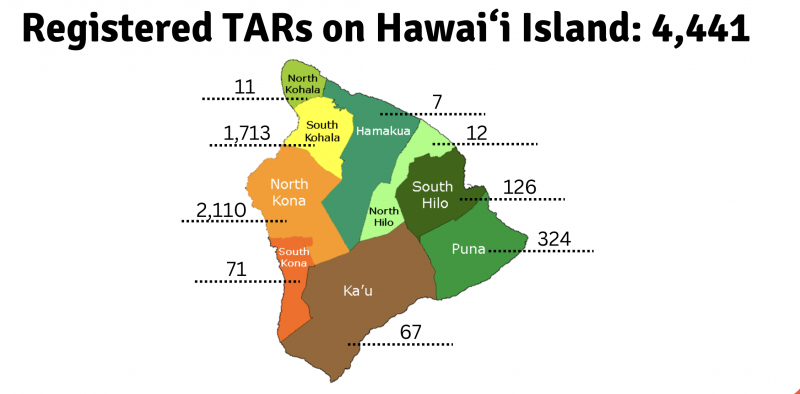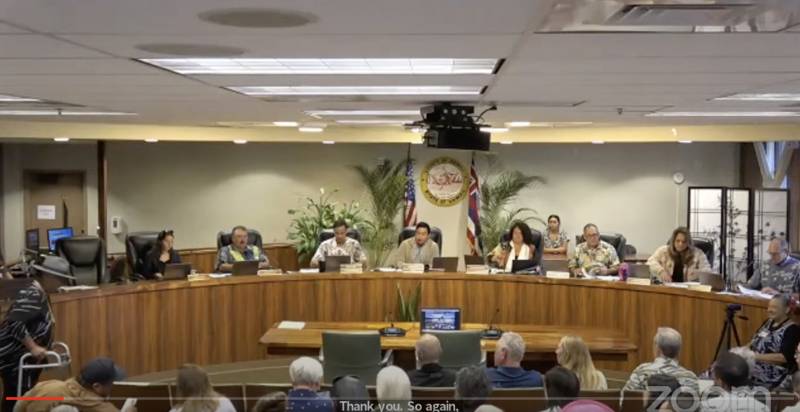Big Island Short Term (Transient Accommodations) Rental Bill Goes to Planning Commissions
In 2019, Hawaiʻi County passed an ordinance requiring registration and regulation of unhosted short term vacation rentals – ones where the owner does not live on property. At the time, the County said that once they had experience with administering that program and working out the kinks, they would follow with similar regulations for hosted rentals (in popular lingo, “Airbnbs”). The first draft of legislation was introduced in November 2022; I have written about changes in four successive drafts as the council members took into account feedback from the public as well as advice from lawyers and the County Planning Department on technical aspects.
We now have a package of three bills, introduced to County Council in January 2024. This post covers the process it will go through from here and how you can follow or contribute your testimony.

This slide from the January 20, 2024 TAR presentation shows the location of the currently registered long-term Transient Accommodations Rentals on Hawaiʻi Island – a number set to grow with the new package of legislation.
Why Three Bills Concerning Big Island Short-Term Transient Accommodations Rentals (TARs)

Hosted Transient Accommodations Rental or “AirBnB” or Licensed B&B – the package of bills will sort out administrative conflicts
Bill 121 is the primary bill, establishing a framework for regulation of Transient Accommodations Rentals (short-term vacation rentals where the host is present on site). Note that the use of the term “Transient Accommodations Rentals” rather than the term “short-term vacation rentals,” which was used when unhosted rental regulation was introduced, is to conform better to Hawaiʻi State statutes, which require owners to collect and pay Transient Accommodations Tax (TAT) on such rental income. You might be familiar with TAT as it is also a big add-on to your hotel bill.
I have covered the primary points of this bill in previous posts about proposed TAR regulations.
One of the main clarifications in the drafts of this bill was to accommodate both situations in which the owner lives on the same property and has a vacation rental unit or room(s), and the case in which the owner has an on-site manager hosting their rentals. The bill has also evolved to be more lenient towards future registrations of properties not yet in the rental market.
The majority of the testimony will be against the bill. For the sake of full disclosure, I happen to be in a minority within the real estate community in supporting most of the provisions of the bill. I do sell a lot of investment properties with short term rentals, primarily in the Kona and Kohala Coast resorts. I stay in short-term rentals myself and am a huge fan of Hawaiʻi Life Vacation Rentals. However, having worked on County planning issues for my North Kohala district, including 15 years supporting the creation of affordable for sale and rental housing, I believe the studies that show that the proliferation of short-term rentals in residential neighborhoods – and on agriculture-zoned properties where there is not legitimate, commercial activity (a requirement of the state statute) – diminishes the availability of housing for local residents at lower and median income levels.
The Planning Directorʻs report and recommendations runs over 100 pages, but this document is worth reading if you want an in-depth understanding of the program that is likely to pass.
It became clear during the discussion of the drafts of the Transient Accommodations Rentals (TAR) bill that to eliminate confusion for property owners and to streamline administration of the regulatory scheme, two sections of the current Zoning Code would need to be updated. A second purpose, as revealed in the Planning Directorʻs comments on Bill 121, is to be as consistent as possible with emerging changes in land use laws on the State level.
Bill 122 eliminates the section of the Zoning Code describing the existing regulatory process to be licensed as a Bed and Breakfast. Otherwise, after the passage of some version of Bill 121, owners would have a choice between two conflicting processes for creating a legal hosted vacation rental. In a sense this is a housekeeping measure. The Planning Director is recommending amendments that clarify how previously licensed B&Bs will be “grandfathered” in with their currently granted requirements.
Bill 123 deals with what are called ʻohana dwellings, a term defined in state statute and implemented at the county level in 1996 to provide for building a second dwelling on a residential property for extended family. Those dwellings are typically referred to across the country as “Additional Dwelling Units” or ADUs, and the Hawaiʻi County Code would follow this terminology. The main purpose of this bill is to make it easier to build an ADU in order to ease the shortage of housing for the local population, including long-term rentals. With that as a purpose, the bill also restricts the use of ADUs as long-term rather than transient accommodations rentals. Finally, there are restrictions relative to underlying state land use classifications of conservation or agricultural, which are governed by state statute.
Next Steps for the Big Island Hosted Transient Accommodations Rentals Bills

Testimony from the public can be submitted prior to the Planning Commission meetings in writing, or on the day of the meeting via Zoom or in person
Having been heard by County Council, the package of bills has been sent to the two Big Island Planning Commissions for review. Hawaiʻi Island has two planning commissions reviewing subdivision and zoning matters, as the economy and development issues are quite different on the Kona (west) and Hilo (east) sides of the island. (In fact, my very first blog post on this site 15 years ago mentioned the split of the Planning Commission.)
Windward Planning Commission will consider the proposals on Thursday April 4
Leeward Planning Commission will consider the proposals on the afternoon of Thursday April 18th.
If you want to see the agendas and testimony, watch the livestream or testify via Zoom, the links to do so are here:
Windward Planning Commission Thursday April 4. The meeting starts at 9 am but there are four agenda items before the TAR bills.
Leeward Planning Commission Thursday April 18. The meeting starts at 9:30 am but with a full agenda of unfinished and new business on other matters, the bills will be heard beginning at 2pm.
The recommendations of the Planning Director and two Planning Commissions will go back to the County Council. The package of bills might go through another round of edits, but are unlikely to simply die. Both at the Hawaiʻi State level and in other Counties, a great deal of attention is being focused on further regulation of short-term rentals. If you are considering buying a Big Island property with an unhosted vacation rental – or hope to establish one – you can bookmark or subscribe to my blog for updates.




Anthony
April 19, 2024
We own a unit that cleared all hurdles and been “certified” as a STVR in a resort complex when we are not there. I am sure like many others we are quite concerned with what is being called a “ban” on STVR’s. I have been coming to Big Island for over 50 years. Thank you for keeping us informed. Mahalo nui loa.
Beth Thoma Robinson, R(B)
April 19, 2024
> Hi Anthony, as long as you are in resort zoning and the individual complex does not have CC&Rs restricting rentals, you do have to register but there is never going to be a ban on short term rentals in the zoning that was explicitly designed for that!
L A.
August 10, 2024
Aloha Beth. it is not the responsibility of privately-owned property to create affordable housing. It is the STATE’S responsibility to create and provide affordable housing. So rather than bully those of us trying to supplement our measly incomes to afford to live here, tell the STATE to start building affordable apartment complexes for the people!!!
Beth Robinson
August 11, 2024
> Aloha L.A.
Thank you for your thoughts. Sorry you feel you are being bullied. The issue I think is that our local people who grew up here do not want to be segregated into newly built apartment complexes. They want to be able to remain in the homes and neighborhoods where their families have been for generations.